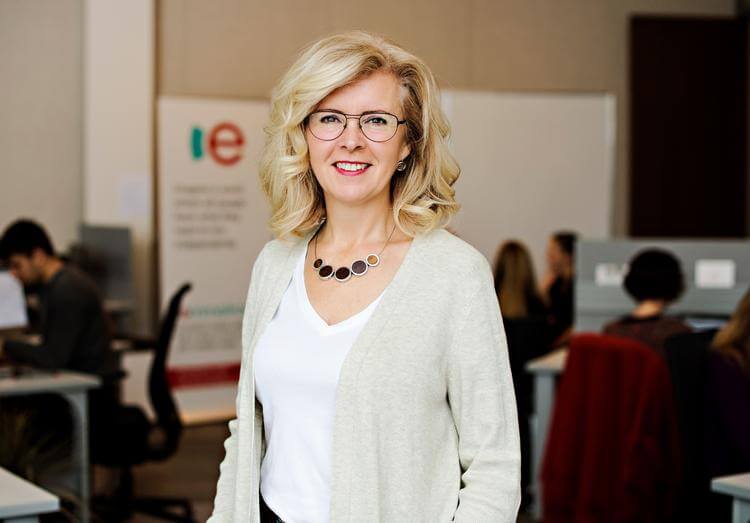Accelerator Centre welcomes 23 startups into the new UN Sustainable Development Cohort of AC:Studio
By: The Accelerator Centre Selected startups will receive up to $100,000 in seed funding and work with the AC and…
R+T Park: Every business has a founder story – what is yours?

MPH: In 2013, I left Blackberry. I knew I wanted a big challenge. I also knew I wanted to do something that mattered and made a difference in the world. When I took the time to really dig deep, I knew that “something” had to do with dementia. This was because of my relationship with my grandmother, who lived with Alzheimer’s for 13 years before she passed away. She didn’t have a good experience and I knew I wanted to help others with the disease to make things better, and live fuller, more productive lives.
Volunteering has been part of my life from a young age and after BlackBerry, I was able to devote more time to it. I reached out to the Ontario Brain Institute and to the Murray Alzheimer Research and Education Program (MAREP), and began to facilitate and run groups for people living with memory loss. I started volunteering with Hackathons and began consulting with companies to help improve the design and development of products for people living with cognitive impairments. Out of this work I began to have an idea for a tool — a mobile memory aid — to help people with early to mid stage dementia live better lives. That’s how Emmetros and our product MemorySparx began.
R+T Park: Why is your MemorySparx mission so important/critical to society?
MPH: There are currently 47.5 million people living with dementia globally. This number will double by 2030 and triple by 2050. There are 7.7 million new cases of dementia diagnosed every year. In 2017, we surpassed the one trillion-dollar mark in terms of healthcare costs devoted to dementia care. This is an enormous global problem. When I began digging into the numbers, I learned that most companies and organizations providing tools and services for dementia care focus on the last 40 percent of the journey, when individuals are in the last stages of the disease. I also learned that 20 percent of people who enter long term care institutions are there too early, but end up there for various reasons — caregiver burnout, inability to afford personal care, lack of family support.
Yet, people live with dementia anywhere from three to 20 years. I saw the gap in available resources for the 60 percent of people who are living in those early to mid-stages. Dementia advocates want the world to see that these folks have a lot of life to live. They don’t want to be written off. They want the opportunity to live their lives fully. So, our team took up the call to action to help these people live better and more independently in those early to mid-stages. And I don’t mean just physically living, but rather, giving them what they need to feel confident, competent and able to contribute to their communities in a meaningful way.
R+T Park: You feel very strongly about team and have strong opinions on the matter – what kind of a culture and value system are you building at Emmetros?

MPH: Our approach to our employees is the same as our approach to people living with dementia. We are person-centered. We get to know the whole person. We understand their values, their strengths, and what they want from a work environment. We go out of our way to try to give it to them, going so far as to bake their values and personal goals into their employment contract. This holds us and the employee accountable to these priorities.
You hear lots of companies paying lip service to employee well-being. We sincerely want our team members to be happy and fulfilled, and we incorporate this into our planning. No one is penalized because they need personal time. Sure, as we grow we will have to all give a little bit, but we’ll do everything in our power to make sure that our culture of care is maintained.
This person-centered culture works because we are extremely picky about who gets through the door in the first place. As I’ve grown Emmetros, I have refined the model by which we hire. First, we look for a person with a high degree of self-awareness. They must understand their strengths and weaknesses. They are direct in expressing what they want in life, from a role, from an employer. They also know their value and are able to articulate clearly what they would bring to the job. Second, we look for integrity. The people on our team have a track record of doing what they say they will do, of delivering on commitments, and of acting in line with their values. And finally, we look for good intentions. When potential candidates say they want to work for Emmetros because they want to make a difference, I ask, “why”? The people I hire know the why behind the why. They want to be role models for their daughters, or they want to bring joy to people who are having a tough day. That reason matters. One thing to keep in mind is that high performing people are often their own worst enemy. They are often the first to sacrifice family life in order to help a company accomplish an urgent goal. When we all know what our individual values are, outside of work, and we are all committed to each other’s success, inside and outside of work, we hold each other accountable to make sure that caring — for each other, for ourselves, for our families, for our customers — remains core to our culture and our brand. As a result, we’ve been able to build a team that is made up of highly qualified and dedicated people who care deeply, and that really does shine through in everything we do.
R+T Park: You are among a number of BlackBerry alum who have chosen entrepreneurship and to grow a startup at the Accelerator Centre (AC). What drew you to the AC and what has your experience been like to date?
MPH: I actually took my time picking our incubator. I spent a year and a half developing the Emmetros business plan and interviewing incubators. And when I met with the AC team, we spent a thoughtful two-hour meeting exploring my idea and plan, and I just knew it was the right fit for me.
The AC’s model provides the right kind of care and support for a more mature entrepreneur. It offers its startup clients a team of advisors and mentors who work together and who work with us as founders to meet us at wherever we are in our company’s development. That approach allows us the flexibility to come to the AC as a more mature, experienced team. Everything we do at Emmetros is also evidence-based. We conduct careful research for every aspect of what we do. The AC’s strong affiliation with the University of Waterloo was another key attraction for us.
I have to say, I quite enjoy the fact that I come to the AC every day and see other BlackBerry colleagues — everyone from developers to previous senior vice presidents — working on their startups. It’s like a flattening of the old hierarchy. We’re all just the same now – unified through entrepreneurship, and we’ve become friends because of it.
R+T Park: We’re kicking off the new year with this Watch profile. What does 2018 hold for Emmetros, for Mary Pat, and for users of MemorySparx?
MPH: 2018 is going to be a pivotal year for us. On the technology side, we are now building out our full ecosystem of products. In 2017, we launched MemorySparx One, an iPad app which allows people with dementia to communicate with confidence. Our next product, which is slated for delivery this summer, will incorporate a family portal so family members can support their loved ones, even from afar. We are also working on our enterprise product which will provide a tool that care communities and homecare service providers can use to support multiple people living with dementia. On the marketing and sales side, we have a fairly aggressive strategy kicking off this year. This is new and very exciting for us. We released our first product last year and deliberately kept our marketing small and controlled. But this year, we are fully focused on selling and getting MemorySparx into as many hands as possible. Finally, to support these efforts, we are focused on team growth, and will be hiring designers and developers and growing our sales and marketing team. This really is going to be a fantastic year.